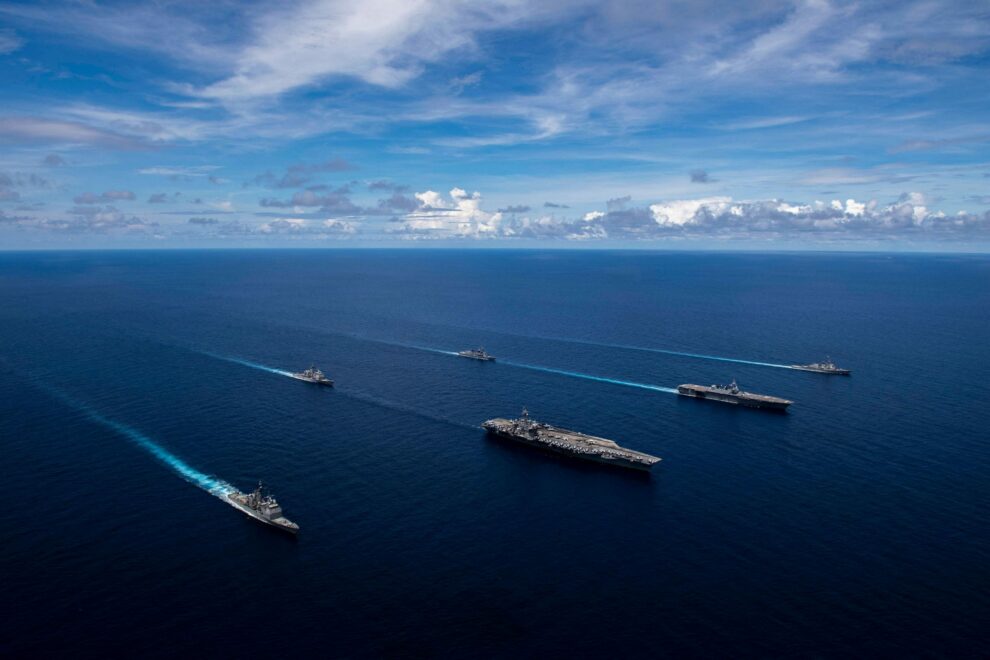Early this month, George Yeo, former Foreign Minister of Singapore, returned to Cambodia after his last visit to the country in 1999. His visit was notable for his well-received public lectures at both the National Institute of Diplomacy and International Relations, under the Ministry of Foreign Affairs and International Cooperation of Cambodia, and the Royal University of Phnom Penh.
Subsequently, on December 8, 2023, the Khmer Times published an op-ed by Mr Yeo titled “Why the West Should Not Give Up on Cambodia.” In this piece, Mr Yeo provides a balanced analysis of Cambodia’s remarkable transformation. He underscores the country’s journey from being ravaged by conflict to achieving a state of peace and developing a vibrant economy.
The article also addresses Cambodia’s foreign policy. Although I noticed its overall objectivity, there is one critical issue that I would like to draw readers’ attention which is the South China Sea dispute. The issue is one of the most intricate and hotly contested geopolitical issues in the Asia Pacific region, involving regional and global powers. Cambodia is not immune to this complex dispute.
In his commentary, Mr Yeo wrote, ‘When Cambodia blocked the issue of a joint statement communique by ASEAN foreign ministers in 2012 and 2016, many felt that the decision was taken to please China’.
It is crucial to clarify that the 2016 ASEAN Foreign Ministers’ meeting did manage to issue a joint communique after a tense debate.
Indeed, ASEAN did not succeed in issuing a joint communique in 2012 during Cambodia’s tenure as the ASEAN Chair. This period was marked by allegations that Cambodia was collaborating with China to obstruct discussions on the South China Sea within ASEAN meetings, claims that Cambodia subsequently refuted.
It is noteworthy, however, that following this impasse, ASEAN foreign ministers eventually reached a six-point consensus on the South China Sea issue. This breakthrough was largely attributed to the shuttle diplomacy efforts of the then Indonesian Foreign Minister, Marty Natalegawa. This development illustrates Cambodia’s ability to adapt and approach diplomatically sensitive issues with a pragmatic mindset.
Challenging the Criticism
Former Prime Minister Hun Sen has been vocal in questioning why Cambodia was singled out for the South China Sea issue when other ASEAN Chairs faced similar challenges.
He characterized the singling out of Cambodia as ‘injustice’. At the graduation ceremony at one university in Phnom Penh in February 2016, he said, “Those who attacked Cambodia or me personally apologize to me and repay my justice.”
“Maybe it is time to return justice to me. I told John Kerry I was disappointed when the critics said that Cambodia’s closeness to China was the obstacle to realizing the Code of Conduct in the South China Sea,” he added.
He drew attention to the fact that even when Cambodia was no longer the Chair of ASEAN, other ASEAN Chairs also failed to make progress on the issue, including an attempt to finalize a binding, substantive Code of Conduct (COC).
“Before Cambodia took its turn, Vietnam and Indonesia were the rotating Chairs of ASEAN. Why couldn’t they realize it? Did they do it after Cambodia’s turn, Brunei, Myanmar, and Malaysia? What could they say about it?” he literally asked.
Cambodia’s Stand on Sovereignty Disputes
Cambodia has consistently pushed to address the South China Sea issue within a regional context, cautioning against its over-internationalization. This stance, articulated by then Secretary of State Kao Kim Hourn in 2012, emphasized ASEAN’s role and the ASEAN-China mechanism in handling the dispute.
Cambodia also underscores the importance of direct negotiations between concerned parties. This approach aligns with the understanding that ASEAN, while instrumental for regional peace and cooperation, is not the arbitrator in sovereignty disputes.
Mr Hun Sen’s statements at various forums, especially in early 2016, reiterated Cambodia’s view that ASEAN should not intervene in territorial and sovereign disputes between the Member States or between the Member State(s) and other countries, advocating for bilateral negotiations between concerned parties.
“ASEAN does not have rights to divide land among them. Vietnam and China would have to sit down and work together. The Philippines and China, or the Philippines and Vietnam, will have to sit down and work out their differences,” Mr Hun Sen said in early 2016.
Asserting Independent Foreign Policy
Then Prime Minister Hun Sen had consistently affirmed Cambodia’s independent and sovereign foreign policy, emphasizing the nation’s strategic autonomy from major powers like China and the United States.
This stance is pivotal in understanding Cambodia’s approach to regional issues, reflecting its commitment to navigate a course based on national interests and principles.
In response to the 2016 arbitral tribunal’s decision regarding the South China Sea, Mr Hun Sen declared Cambodia’s unwillingness to support the decision, advocating for bilateral negotiations to resolve disputes.
He said the tribunal’s decision is “politically motivated.” The Philippines did not consult other ASEAN Member States before bringing the case against China- deviating from the spirit of the Declaration on the Conduct of Parties (DOC) in the South China Sea
Cambodia’s Ministry of Foreign Affairs and International Cooperation issued a statement on 9 July 2016 stressing that “Cambodia views this arbitration case is to settle dispute brought by the Philippines against China, and this proceeding is not related to all ASEAN Member States. Therefore, Cambodia will not join in expressing any common position on the verdict.”
Cambodia’s South China Sea dispute narrative showcases a nation striving to balance regional dynamics, uphold sovereignty, and advocate for a realistic and pragmatic approach to dispute resolution. While facing criticism and challenges, understanding Cambodia’s perspective is key to appreciating the broader context of this ongoing complex, volatile geopolitical issue.










